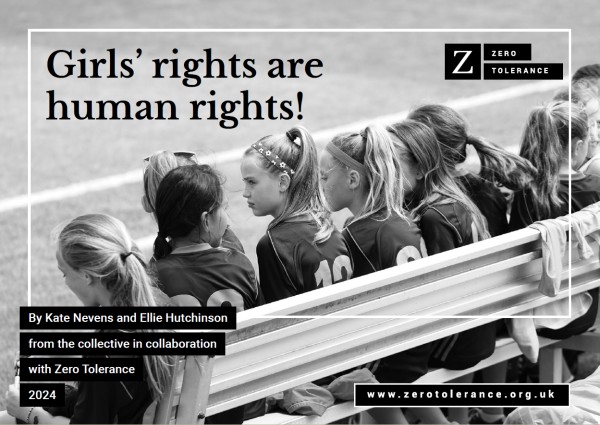News and events
We’re failing girls. Here’s what to do about it.
Scotland should be a place where all children reach their potential. We can achieve this by respecting, fulfilling, and protecting human rights.
But, our new research shows how we’re failing girls. In collaboration with the collective, we found girls’ human rights to safety, education, play, health, and participation are not being met.
Human rights policy and practice often focus on either improving the world for women or for children. Policy makers fail to consider how age changes women’s needs or gender changes children’s. This means girls fall through the cracks in legislation.
Girls Rights are Human Rights! summarises alarming evidence on the state of girls’ lives.
Girls are sexually harassed in public, face misogyny online, and experience sexual and domestic violence. Police Scotland found girls under 12 are the most likely to experience sexual abuse and 12 – 18 year olds the most likely to experience rape.
In schools, girls continue to experience sexual harassment and other forms of violence, preventing them from concentrating on learning. Teachers and senior management do not have the skills or resources to respond to their violence and support girls through it.
All children should have the freedom to play, but gender stereotypes limit the activities girls can take part in. Sexual harassment and feeling unsafe also limit girls’ ability to enjoy the outdoors and public parks, whilst misogyny stops them enjoying online gaming.
This violence and lack of freedom to play impacts girls’ health. Girls’ happiness has been in decline over the past decade (particularly for girls aged between 7 and 10). Reports find young women are three times as likely as young men to suffer from common mental health problems. But when girls seek healthcare they are often labelled as attention seeking. Girls also feel dismissed when accessing physical health care and struggle to access reproductive healthcare.
Girls feel their opinions are dismissed and silenced. Policy makers often fail to adequately engage girls.
There is a simple solution. With the government’s plan for Scottish human rights legislation, we have an opportunity to ensure girls thrive.
Consider girls.
When talking about human rights, policy makers and activists must ask how a policy or practice will impact girls.
What do girls need?
How do we respect and fulfil these needs?
By asking these questions and writing legislation with girls in mind, we can create a Scotland where all children reach their potential and thrive.
Listen to a discussion of the reports' findings:
Learn more by reading the:
Our response to the Behaviour in Scottish Schools: Research Report 2023 and the Cabinet Secretary for Education and Skills' ministerial statement on behaviour in Scottish schools 29/11/23
We’re pleased the Cabinet Secretary for Education and Skills and the Behaviour in Scottish Schools: Research Report 2023 acknowledge misogyny as a key issue in our schools which they commit to tackling. This report affirms what other research has found: sexism, misogyny and gender-based violence are problems in schools in Scotland. We look forward to working with the Scottish Government on the announced National Action Plan to tackle this issue.
The Gender-Based Violence in Schools Framework is an excellent starting point for this work; however - as a non-statutory guidance document it will not alone solve the problem of violence and misogyny in schools. We therefore look to the Action Plan to provide solutions to harmful masculinity, misogyny and violence against girls, and provide guidance on accountability and consequences for those causing harm which realise survivors’ rights. We are happy to support the Scottish Government by providing Zero Tolerance’s 30-years of expertise on preventing violence against women and girls as they develop this work.
“Girls urgently need the Scottish Government to protect their right to safety and freedom from harm. Boy’s violence against girls is flourishing in schools and current approaches are not working. We’re eager to work with the government on this issue so both teachers and children can focus on learning.” — Laura Tomson, Co-director Zero Tolerance
We have five asks of the Scottish Government:
Include girls in the National Action Plan
We are glad to hear the Cabinet Secretary, Jenny Gilruth, state that the National Action Plan will include pupils. We are disappointed that children and young people were excluded from the Behaviour in Scottish Schools research. Girls experience misogyny and violence from boys at school, which affects their ability to focus on learning. To end misogyny and boy’s violence in schools, we must listen to girls’ experiences to accurately understand the problem, and work with them directly on solutions.
Tackle the root cause
The Cabinet Secretary is correct in her assertion that neither the pandemic nor extremist misogynistic social media influencers are causes, but rather, exacerbate boys' violence and misogyny. It is crucial that work to eliminate these issues focuses on tackling the root cause of gender inequality and the gender stereotypes and unhealthy masculinities that underpin it.
By focusing on improving gender equality in schools, we can tackle misogyny and other forms of violence, educational attainment, truancy, bullying, and absence.
Provide detailed guidance on restorative approaches to boys’ violence against girls
To be effective, the action plan must provide procedures for restorative approaches to boy’s violence against girls. We agree with the concerns raised by teachers in the research, which were echoed at the summit, questioning the effectiveness of restorative approaches due to a lack of support to ensure accountability is part of the process.
We know these approaches can be effective, but without accountability and consequences, restorative approaches to boys’ violence against girls re-traumatises survivors, tells them they don’t matter, and effectively gives boys permission to repeat their behaviour. Restorative approaches need resources, expertise, and understanding of gendered power, which currently goes beyond what teachers can provide. Teachers urgently need guidance on this.
Gather disaggregated data
To monitor misogyny in schools and evaluate the effectiveness of the National Action Plan, it is vital that future research measures women teachers’ and girls’ experiences of violence and misogyny. The research must further disaggregate types of violence to help us understand its gendered element. For example, ‘verbal abuse’ and ‘physical violence’ must be broken down into categories such as misogyny, sexual harassment, and sexual assault. The Scottish Government must also gather equalities demographic data to understand how diverse communities of people with protected characteristics experience violence.
Reconvene and Resource the Gender Equality Taskforce
In addition to the national action plan, we ask the Scottish Government to reconvene and properly resource the Gender Equality Taskforce on Education and Learning, which is supposed to be chaired by the Cabinet Secretary. This has not met formally since August 2022 and has failed to make any significant progress since its inception in 2019. The issue of boys’ violence against girls and misogyny in schools makes it clear that this taskforce is needed. We hope to see the Taskforce’s work integrated with the Education Reform process, which creates a unique opportunity for transformational change in Scottish education, so that we can get it right for every child, including girls.


 Zero Tolerance IWD22 Press Release
Zero Tolerance IWD22 Press Release